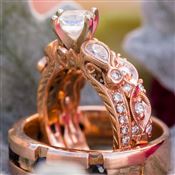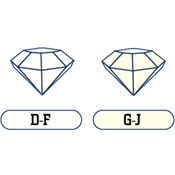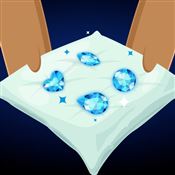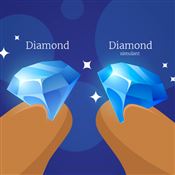Platinum vs Gold: Which is Better?
Platinum and gold are the top choices for rings. Which is better for you? Read on to learn the differences in price, durability, and care.
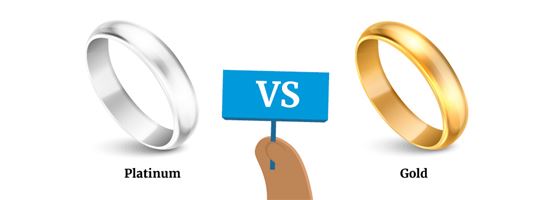 |
Both platinum and gold make for strong, beautiful rings. But both have their issues. Which is better for you? Learn the differences and the pros and cons of each.
About Platinum
Platinum is known as the "most prestigious" metal because of its high price point.
It is a purer metal. Platinum jewelry is made with 950 platinum, which means it's made with 95% pure platinum. The other 5% is made of alloys like palladium, iridium, and cobalt. The color of platinum is naturally silvery-white.
Platinum is naturally hard and needs no additional strengthening. It makes for very durable jewelry that can last for generations. However, it can get scratched quite easily. The metal will then start to look dull, which can only be fixed with professional polishing.
Pros
- More durable for holding diamonds in place
- More luxurious "weighty" feel
- Hypoallergenic
- Lasts longer; band will not thin out
Cons
- Most expensive
- Difficult and expensive to resize
- More easily scratched and dinged
- Gets dull fast and needs re-polishing often
About White Gold
White gold is currently the most popular choice for engagement rings because it has an expensive platinum look at a lower cost.
Unlike platinum, white gold is not a natural metal. Instead, it's made by mixing gold (which is naturally a rich yellow color) with silver-colored alloys, such as nickel, zinc, and palladium. This turns it into a pale yellow color. Then it's dipped in rhodium to achieve the bright shiny silver look.
Gold is also naturally very soft, so the alloys make it strong enough for jewelry. The rhodium plating also strengthens it and makes it more resistant to scratches. But the rhodium wears off and will need to be re-plated every couple of years.
The two metals appear very similar. Because of the rhodium plating on white gold, it actually makes it a tad more silvery-white than platinum. But the casual admirer will most likely not be able to tell a difference.
Pros
- Platinum look for less
- More resistant to dents and scratches
- Stays shiny longer
Cons
- Needs rhodium replating every couple of years
- Nickel content may cause skin allergies
- More likely to crack in a direct hit
Platinum vs Yellow Gold and Rose Gold
 |
| © CreditDonkey |
Now, what about
These two metals are the easiest to maintain. You don't need professional polishing or re-dipping. Just simple home care with soap and water will maintain the shine.
Another advantage of yellow gold and rose gold is that they can accommodate lower color diamonds (such as J or K diamonds), so you can save some money in that area. On the other hand, the silvery-white of platinum and white gold will make yellow tints in a diamond even more noticeable.
If you're interested in these metals, read our detailed articles about white gold vs yellow gold and rose gold.
Yellow Gold
Made with alloys such as copper, silver, and zinc. Because it doesn't have rhodium plating, yellow gold is softer and more easily scratched.
Pros
- Cheaper than platinum
- Very little maintenance required
- Easiest and cheapest to service and resize
- Can accommodate lower color diamonds
- Most hypoallergenic of the golds
Cons
- Least durable out of the golds
- More easily scratched and dented
- More likely to crack in a direct hit
Rose Gold
Mostly mixed with copper to achieve the pink color. Copper is a very hard metal, so this actually makes rose gold the strongest of the golds.
Pros
- Cheaper than platinum
- Most resistant to scratches and dents
- Can accommodate lower color diamonds
- Very little maintenance required
Cons
- Copper content may cause skin allergies
- The band color can change over time
Detailed Comparison
 |
| © CreditDonkey |
For most people, you already know which color appeals most to you. You either like cool silver, warm and sunny gold, or romantic rose gold.
If you like the cool silver look, then your options will be either platinum or white gold. This is harder to choose between because they look pretty much the same. So in these detailed comparisons, we're only breaking down the differences between platinum and white gold.
Pricing
The biggest reason people choose white gold over platinum is that white gold rings are a lot cheaper. For exactly the same style ring, platinum can cost several hundred dollars more.
For example, take this very simple, classic solitaire ring.
It costs $240 for 14k white gold or $580 for 18k white gold. The same ring in platinum costs $820. That's a lot of extra money for something that has no difference in appearance. You may want to put that money towards getting a better center stone instead.
If you have a platinum engagement ring, it's recommended that your wedding ring is also platinum. This is so you don't have rings of different hardnesses rubbing against each other and wearing the softer one down. So consider this as well since it may not be just a one-time bigger investment.
Platinum - as a metal - is not more precious than gold per ounce. However, platinum rings are more expensive for several reasons:
- Platinum is mined less than gold. Only about 160 tons of platinum are produced per year, compared to 1,500 tons of gold.
- Platinum jewelry is made of 95% pure platinum, while gold jewelry is only made of 58% – 75% pure gold.
- The price of precious metals is based on weight, and platinum is a naturally denser material and weighs more.
- Platinum is harder to work with and requires a different set of tools and gas, so labor costs are higher.
Appearance
A brand new platinum ring and white gold ring will look identical. Platinum leans towards gray while white gold is more silvery-white. But the difference is so tiny, so you'll barely notice a difference even if you put them side by side.
But it's different for old platinum or white gold jewelry. Each precious metal ages differently. Over time, white gold becomes yellow and must be replated. Platinum stays silvery-white but turns dull. So your ring might be distinguishable after a few years without care.
Durability
There are 2 parts to durability: hardness and brittleness. Let's go over both.
- Hardness (How Resistant it is to Scratches)
Platinum is a naturally harder material than gold. So many people think that it won't get scratched up as much.HOWEVER, remember that gold rings are not pure gold. They're mixed with alloys to make it harder. This actually makes white gold harder than platinum and more resistant to scratches and dings.
White gold is better for those with an active lifestyle.
- Brittleness (How Easily it Breaks)
Even though white gold is harder, it's stiffer and more brittle than platinum. This means the delicate prongs are more likely to crack if hit just right.Platinum can take more stress. If there's a direct hit, the metal just bends slightly instead of breaking. Platinum prongs will hold diamonds in place more securely.
If you want a setting with a high-set center stone, then perhaps platinum is the better choice.
White gold will hold up better to scratches and dents from normal daily wear and tear, so it's better for active wearers. However, prongs are easier to break in case of a direct hit.
Maintenance & Care
Platinum Care
Because platinum gets scratched up more easily, it can become dull pretty fast. A lot of people with platinum rings are surprised to find that their beautiful, shiny new ring looks dull within just months.
As it gets more and more scratched up, platinum will develop a "patina finish"—a dull gray matte texture. A lot of people actually like this for its more antique feel. You will need professional polishing to get rid of it and make it shining like new again.
White Gold Care
White gold, on the other hand, remains shiny for longer even with scratches. However, remember that rhodium plating? It'll wear down with just normal daily wear. Eventually, the pale yellowish color of white gold will start showing.
White gold needs rhodium re-plating every couple of years. It'll look bright and as good as new after each re-plating.
Another thing to note—over time, gold will start to thin out, especially at the places with the most wear (like at the bottom). This may cause breaking or bending when it becomes too thin. A jeweler can fix this.
Comfort
Sensitivity to Skin
If you have metal allergies, platinum is the only choice. Platinum jewelry is mostly pure platinum, so it's hypoallergenic. Anyone can wear it without worrying about itchy skin.
This may not be true for white gold jewelry. Remember how white gold contains alloys? This includes nickel, so it may cause skin irritations if you have a nickel allergy.
Weight
Platinum is around 2x heavier than white gold. You will feel that the same ring is heavier in platinum vs white gold.
Diamond ring shoppers have mixed opinions about this difference in weight. If you like a sturdier or premium feel, you might prefer platinum. But if you're getting a bigger ring or you like something light, go for white gold.
Resizing & Serviceability
There may be times when you need to get your ring resized or repaired. Gold is easier to service and there are more jewelers who are more experienced in working with gold.
Because of the hardness of the metal, platinum rings are tough and more expensive to resize. It requires more time and a different set of tools and burning gas.
Often, there are complaints that resizing has left a visible line or discoloration. Also, the very high temperature required for platinum may cause damage to delicate gemstones and even your diamond. You'll need to make sure you go to a trusted jeweler to service platinum.
White gold rings are much easier to resize. White gold is dipped in rhodium, so there will be no indication at all that it's been resized.
If you're a guy buying the ring as a surprise and aren't sure of her size, you may want to consider that white gold is easier and cheaper to resize. However, jewelers usually offer one free resizing if the ring doesn't fit.
Is Platinum Better than White Gold?
Whether platinum is better than white gold is up to your budget and taste. Both metals have their pros and cons. You might prefer platinum because it's hypoallergenic and less prone to cracking. It can also hold your stones more securely. But it's heavier, more expensive, and more prone to scratches.
And even if you choose platinum, it still looks like white gold and will still need some form of care. So only your lifestyle and wallet can tell if it's worth paying extra for a platinum ring.
FAQs
- Is it better for men to get platinum or white gold for their wedding bands?
Men's wedding rings are usually plain bands. At most, there are a few tiny diamonds embedded in the band. Because they're plainer, we recommend white gold for men's bands.Remember that platinum gets scratched and dinged more easily, so a plain band will look very dull after platinum develops that patina. White gold doesn't dull as much, so you'll enjoy a shiny band for longer.
But if you're a man who likes the worn antique look, go for platinum. A ring that shows wear symbolizes a marriage and all the wonderful journeys.
- Should I choose gold or platinum if I'll engrave my ring?
Gold, white gold, and platinum are all engravable. You can choose any of these metals if you want something engraved on your ring. - Is platinum more valuable than gold?
Yes. Because it's rarer and denser, platinum is more valuable than gold. Some even consider it as the most valuable precious metal. - Should I get platinum or white gold prongs?
Most jewelers recommend getting platinum prongs. Gold is more brittle. That's why white gold prongs are more likely to break when hit hard enough. - Is white gold or platinum stronger?
Platinum is considered stronger because it's less likely to crack. But it's more prone to scratches. That's why gold is better for active wearers.
Bottom Line
Consider the pros and cons of both. You may find that something is particularly important to you. For example, if you're very sensitive to nickel, then your best choice is obviously platinum. If you're very active, then maybe you'll want to go with white gold because it'll hold up to scratches better.
Whichever you end up choosing, both are beautiful and make for long-lasting rings. Just be aware that both have their quirks and will need care and maintenance.
Write to Anna G at feedback@creditdonkey.com. Follow us on Twitter and Facebook for our latest posts.
Note: This website is made possible through financial relationships with some of the products and services mentioned on this site. We may receive compensation if you shop through links in our content. You do not have to use our links, but you help support CreditDonkey if you do.
|
|
|
